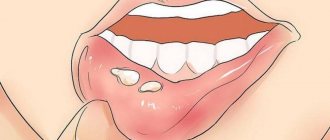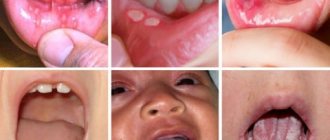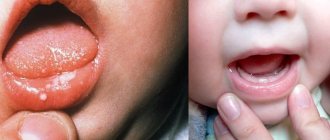Have questions?
Stomatitis is a disease in which the oral mucosa becomes inflamed.
Stomatitis is accompanied by the appearance of painful ulcers and wounds in the mouth, which cause significant discomfort to the patient. They are localized on the gums, tonsils, inner lips, cheeks, and under the tongue. The disease is most often bacterial or viral in nature and occurs as a result of poor oral hygiene or microtrauma of the oral cavity, through which microorganisms enter the soft tissues. It may also have an allergic or fungal origin. It mainly affects children, but often occurs in adults.
What does aphthous stomatitis look like?
Aphthae occur on the inside of the cheeks or lips, under the tongue, at the base of the gums, or on the soft palate.
https://img.medscapestatic.com/pi/meds/ckb/75/43075.jpg
They can be confused with manifestations of herpetic infection , but the latter usually appears at the red border of the lips, rarely in the oral cavity - usually on the gums or hard palate.
Aphthae first look like red bumps (papules), which then quickly turn into ulcers, surrounded by a red rim and covered with a gray-yellow coating (exudate). 1-2 days before the appearance of aphtha, there may be a local burning sensation of the mucous membrane.
Sometimes the child or family members notice what often triggers the appearance of aphthae. Journaling can help with this.
According to American data, about 20% of the population suffered from recurrent aphthous stomatitis at one time or another in their lives.
Most often children suffer and usually these are minor canker sores.
The peak incidence of aphthae is 1-19 years.
Antiseptics and their names
If stomatitis appears on the tonsils, then doctors almost always prescribe antiseptic drugs. Such medications prevent the proliferation of pathogenic microorganisms and eliminate existing viruses, fungi and bacteria. The following remedies can be used at home:
- “Miramistin” or “Chlorhexidine” (the latter must be diluted before use) - the drugs eliminate the growth of bacteria, viruses and fungi, so you can’t go wrong with this medicine. Zelenka is an outdated, but proven remedy for the treatment of stomatitis, treatment of ulcers is done pointwise. Lugol - one of the most effective means for treating tonsils, treatment is carried out with a sterile cotton swab soaked in a solution. “Fukortsin” - has an antimicrobial and antifungal effect, promotes rapid tightening of aphthae and improvement of well-being. “Hexoral” - effective if stomatitis on the tonsil is caused by a herpetic infection, it is applied using a spray and has a pleasant taste. “Tantum Verde” is a spray that has an antiseptic and analgesic effect, suitable for use even in pregnant women.
All antiseptics must be used carefully. Many of the drugs described have a drying effect, which can be harmful if used excessively.
Types of aft.
Small aphthae is the most common type of aphthae (80-85%). Their size ranges from 1 to 10 mm. Ulcers can appear singly or several at a time (up to five).
Usually heal in 7-10 days.
Large aphthae (10-15%) - more than 10 mm in diameter, can even be up to 3 cm, deeper, take longer to heal (10-30 days).
They may leave scars behind. Very rare in children.
Herpetiform aphthae (5-10%) are small, from 1 to 3 mm, located in groups like herpetic vesicles. They heal quickly, within 10 days. They are not typical for children; they usually occur in the elderly.
The rest of the oral cavity looks normal - there is no inflammation of the gums, redness of the tonsils and pharynx, enlarged and painful cervical lymph nodes.
There is no fever or other general manifestations.
Aphthae in children is manifested primarily by refusal to eat and drink due to pain in the mouth.
The reasons for the recurrence of aphthae are not completely clear; the most popular theory is related to errors in the immune system.
Doctors most often do not find a specific cause of the failure; most likely it is a combination of several factors.
But doctors still have assumptions about some factors.
Possible complications.
More often, the disease passes without dangerous consequences for the patient. But with weak immunity, especially in young children, severe herpes sore throat can lead to serious complications caused by the spread of the virus to other organs:
- serous meningitis
- heart pain, myocarditis
- pyelonephritis
- encephalitis
- conjunctivitis.
To exclude the development of serous meningitis, you need to consult a neurologist; if you have heart complaints, you need to contact a pediatric cardiologist. If there are changes in the general urine test, you must make an appointment with a pediatric nephrologist.
With proper and effective treatment of herpes sore throat complicated by meningitis, the prognosis is usually favorable. But at the same time, the treatment of the youngest patients requires careful attention. With myocarditis the situation is more severe. Any complications of herpetic sore throat require the intervention of specialists!
What predisposes to recurrent oral aphthae?
Perhaps the microflora of the oral cavity, herpes group viruses, and maybe Helicobacter pylori, a microorganism that causes stomach and duodenal ulcers, play some role.
Also influence:
- injuries to the oral mucosa
- stress
- deficiency of vitamins B12, B1
- vitamin D deficiency
- zinc deficiency
- poor oral hygiene
- nitrates in drinking water
- Sodium lauryl sulfate is a very popular surfactant in the industry, which is often added to toothpastes for better cleaning and foaming effect.
- food allergies (eg, cow's milk protein) or food hypersensitivity (cinnamon, coffee, chocolate, cheese, figs, pineapple, citrus fruits, some spices)
- non-steroidal anti-inflammatory drugs
It is very important to understand: recurrent aphthae is an independent disease (most often this happens) or a manifestation of some systemic disease.
The latter option is rare, but the doctor should always keep in mind the possibility of this situation.
What do doctors advise for home care?
The specialist makes a diagnosis and prescribes treatment, and the implementation of all instructions falls entirely on the shoulders of the parents. Caring for a small child with stomatitis contains many nuances. For example, during this period you should feed your baby only warm food with a mushy consistency, excluding citrus, sour and spicy foods. After eating, be sure to rinse your mouth. If the baby is still very small, then after eating you should give him a little boiled water to drink. Treatment of the oral cavity and application of gels prescribed by a doctor should be done with a special fabric fingertip or a finger wrapped in a bandage (the bandage should then be thrown away).
Important: self-medication is dangerous. Only a doctor can correctly diagnose and give the correct therapeutic recommendations.
What systemic diseases can manifest as aphthae?
- Reiter's syndrome
- Behçet's disease
- AIDS
- cyclic neutropenia
- PFAPA syndrome
The gastroenterologist is especially interested in the connection between recurrent ulcers and specialized systemic diseases.
Celiac disease is found in 5% , and for a long time canker sores may be the only manifestation of a reaction to gluten.
Let me remind you that the estimated prevalence of celiac disease in the general population is about 1%.
Enamel defects and aphthous stomatitis in celiac and healthy subjects: Systematic review and meta-analysis of controlled studies
Other important conditions that manifest as canker sores are inflammatory bowel diseases: Crohn's disease and ulcerative colitis.
Extraintestinal Manifestations of Pediatric Inflammatory Bowel Disease: Prevalence, Presentation, and Anti-TNF Treatment
What can help in finding the cause of aphthae?
A conversation sometimes helps to find out whether relatives have important diseases with a family predisposition - celiac disease, Crohn's disease, lupus erythematosus.
During the examination, the doctor can evaluate the general manifestations of the disease (not typical with ordinary recurrent aphthous stomatitis) and check for the presence of ulcers outside the oral cavity.
The simplest laboratory examination is carried out - this is most often enough.
A general blood test may show anemia due to deficiency of iron, folic acid, and vitamin B12.
The level of neutrophils is also assessed - their decrease may be a sign of the rare systemic disease cyclic neutropenia
A high ESR may be a sign of Crohn's disease and ulcerative colitis.
Serum iron levels may be reduced in up to 20% of recurrent canker sores.
Prevention
To prevent aphthous stomatitis, it is important to prevent exposure to risk factors, namely6:
- monitor oral hygiene6;
- quit smoking6;
- exclude allergenic products10;
- if necessary, replace toothpaste10, dentures8 - traumatic to the mucous membrane or made from materials that cause allergies6;
- visit the dentist regularly, every 3-4 months6;
- avoid stress5;
- treat foci of chronic infection in the body6.
Aphthous stomatitis is widespread, and there are many reasons that cause the disease and maintain its chronic course. To prevent the disease from prolonging, you need to eliminate possible provoking factors as quickly as possible and undergo a course of treatment from a specialist.
to come back to the beginning
Treatment of aphthous stomatitis.
There is no radical and quick treatment.
The main task of the doctor is to fight the pain caused by aphthae. This is especially important for young children, who may refuse to eat or drink due to pain and become easily dehydrated.
For this purpose, local painkillers and drugs are used that form protective films on the aphthae.
The second goal is to speed up healing.
The most popular drugs for healing are anti-inflammatory corticosteroids for aphthae, in rare, especially severe situations - even orally for a short course (prednisolone tablets).
The third task is to avoid or at least reduce the frequency of recurrent aphthae.
For some people, regular intake of vitamins (especially B12), zinc, and iron helps.
Avoiding oral hygiene products containing lauryl sulfate may be helpful.
Together with your dental hygienist, you can consider ways to improve your oral hygiene.
A gluten-free diet will help with celiac disease.
Use of painkillers and antipyretics
Very often, stomatitis on the tonsil is accompanied by high body temperature and terrible pain.
A person cannot eat normally, it is even difficult to drink. But drinking plenty of fluids and eating nutritious food is an important condition for a quick recovery. A variety of over-the-counter antipyretics can be used to reduce fever:
- based on ibuprofen (Nurofen, Burana, Advil) - these drugs are the most popular today, they can be used in infants, but only in the form of syrups and suppositories; products with paracetamol (Panadol, " Efferalgan") - have been known for a long time, act quickly, but negatively affect the functioning of the liver (people with diseases of this organ are not recommended to use); medications with nimesulide ("Nise", "Nimulid", "Nimesil") - effectively and permanently eliminate fever, but they have a negative effect on the gastrointestinal tract, so they should be taken only after meals.
All of the drugs mentioned have an analgesic effect to a greater or lesser extent.
But practice shows that medications based on diclofenac and ketorolac (“Ketorol”, “Ketanov”, “Diclovit”) are most effective in eliminating this symptom. These medications should be taken no more than 3-5 days in a row. Medicines have a symptomatic effect, but do not affect the cause of the disease in any way.
Conclusions:
Aphthae in the mouth recur at some point in life in almost 20% of all people, most often in the second decade of life.
It is difficult to establish a clear and unambiguous reason.
If recurrent aphthae occurs, the pediatrician, physician, or dentist should consider the possibility that rare aphthae are a manifestation of a serious systemic disease.
In such situations, the gastroenterologist must exclude celiac disease, Crohn's disease and ulcerative colitis.
4, total, today











